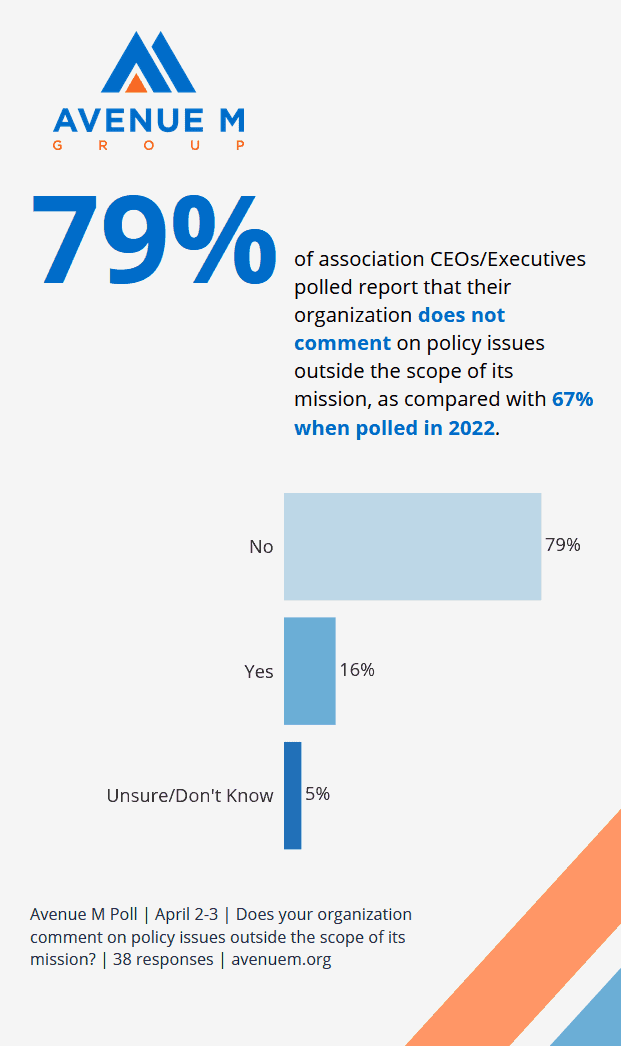A more than ten percent increase in associations that opt out of speaking out on issues not in line with their mission reveals a more cautious landscape.
Even more associations now say they prefer to stay in their lane and refrain from commenting on policy issues beyond their mission scope than they did two years ago. A 2022 Avenue M text poll found that 67 percent of association executives said their organizations usually avoid such topics, while 19 percent said they do take a stand on issues not related to their mission.

However, an early-April Avenue M text poll and LinkedIn poll revealed a more than ten percent increase in association executives—79 percent—who say their groups choose not to speak out on issues that don’t align with their mission. Only 16 percent said they do.
Notably, in 2022, some association executives noted a shift in their organizations’ approach to commenting on social issues following the murder of George Floyd, a departure from past restraint in addressing broader societal concerns.
Now, two years later, as global conflicts like the Russia-Ukraine war and a contentious election year continue, most associations remain reluctant to enter waters that aren’t aligned with their mission.
When asked why their organizations choose to comment—or not—on social or policy issues outside their scope, a CEO said, “Because when you get over your skis you wipe out!” Another CEO said, “We have plenty of issues to focus on within our approved policy set.”
One executive said, “We have created a discussion framework to consider what, when, and how to comment on items. This came together as a result of an inconsistent approach depending on leadership preference and topic.”
A CEO whose group does speak out said, “The board takes a broad view of our scope. For example, diverse scientific enterprises are key to advancing science for the betterment of society. When an incident occurs that could be a setback for that goal, we speak out. To ensure alignment, we have developed criteria and a decision-making process to be used when the possibility of a comment arises.”
It’s understandable why many associations are reluctant to speak out. Taking a stand apart from an association’s stated mission and goals carries many risks. Associations could risk losing focus when they divert resources and attention from their core mission, potentially diluting their effectiveness. There could be member pushback if members are dissatisfied with specific policy advocacy, leading to internal conflicts. Additionally, taking controversial stances on policy issues could affect an association’s reputation if it is perceived as divisive or against stakeholder interests.
To mitigate these risks, it’s important to communicate transparently about advocacy activities, and the rationale behind the policy positions, and invite member feedback. After all, members might expect their organization to represent their interests on a broader range of issues that are not related to the mission. Embracing diverse viewpoints will foster inclusivity and respect within the association. Ultimately, each association has to assess its own risk tolerance.
Want to participate in future text polls? You can sign up HERE.
For more insights on speaking out on policy issues outside of an organization’s mission scope, read Avenue M’s quick summaries of the following resources, and click the links below.
In Wake of Donor Revolt, Nonprofits Are Rethinking Political Statements
Nonprofits and educational institutions are reconsidering their stance on speaking out about current events, especially considering backlash from major donors. While some organizations have traditionally kept quiet on issues not directly related to their mission, events like the protests following George Floyd’s murder prompted many to speak up.
However, recent criticism of statements regarding the Israeli-Palestinian conflict has led experts to advise caution. They suggest organizations carefully consider if their stance aligns with their core mission and engage in discussions with supporters before making public statements.
Effective communication means strategically choosing when and how to speak out to maintain trust and support. It’s essential to:
- Prioritize mission-driven messaging over personal opinions in public statements.
- Develop a clear policy for issuing political statements to maintain consistency and credibility.
- Anticipate and handle pushback, recognizing that disagreements and criticism are inevitable in today’s digital landscape.
Why CEOs Should Speak Out (More)
Americans expect CEOs to speak out on societal issues, according to a study by Weber Shandwick and KRC Research, with nearly half believing their activism influences government decisions.
However, with the increased anticipation for CEO activism, there’s also a partisan split on the matter, indicating a shifting landscape where stakeholders expect corporate leaders to address societal concerns directly.
The study underscores the evolving role of CEOs in navigating political and social issues, emphasizing the importance of authenticity. Despite risks, including potential backlash, the study suggests that remaining silent on pressing issues may also carry a cost, urging associations and CEOs to carefully consider their stance and engage with authenticity in today’s political landscape.
Why CEOs Are Taking a Stand
In this Harvard Business Review podcast, professors Michael Toffel from Harvard Business School and Aaron Chatterji from Duke’s Fuqua School of Business delve into the emerging trend of CEO activism.
They explore how political polarization in the U.S. and evolving employee expectations regarding organizational values are prompting corporate leaders to engage in contentious political and social discussions.
Additionally, PayPal CEO Dan Schulman shares insights into advocating for transgender rights and advises fellow CEOs seeking guidance on assuming an activist role.
Want to be the first to be notified about articles like this? You can learn more about Avenue M’s texting poll service HERE.
Contributors: Sheri Jacobs, FASAE, CAE & Lisa Boylan
Image: Adobe Stock